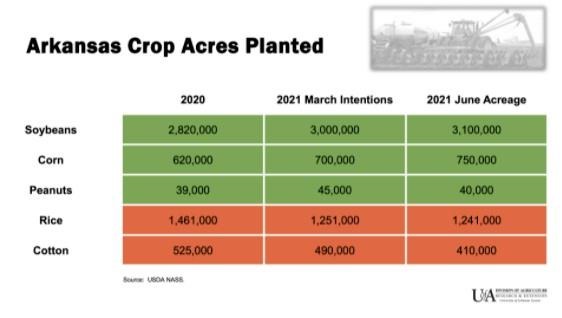By Ryan McGeeney
Arkansas growers responded to a global economy beginning to recover from the COVID-19 pandemic with shifting acreage, betting big on corn and pulling back from cotton, according to data from a U.S. Department of Agriculture report released Wednesday.

UPS AND DOWNS — Arkansas growers responded to a global economy beginning to recover from the COVID-19 pandemic with shifting acreage, betting big on corn and pulling back from cotton, according to data from a U.S. Department of Agriculture report released Wednesday. (Division of Agriculture graphic.)
The annual Acreage Report from USDA’s National Agricultural Statistics Service provides an update to its March Prospective Plantings report and sheds some light on how growers are trying to adapt to shifting market realities.
Planted acreage in Arkansas for principal crops — including corn, sorghum, wheat, rice, soybeans, cotton and more — increased from about 6.9 million acres in 2020 to about 7 million acres in 2021. Nationally, overall acreage increased from about 310 million acres to about 317 million acres.
Scott Stiles, extension economist for the University of Arkansas System Division of Agriculture, said the Acreage Report, combined with the NASS Quarterly Stocks Report, both released Wednesday, gave traders a reason to get behind both corn and soybeans. The commodities finished the trading day 40 cents and 86 cents higher, respectively.
“For those two markets, price recouped a lot of the losses seen over the past few weeks and returned very close to $6 for corn and $14 for soybeans,” Stiles said. “That’s the backstory for the acreage shifts we’ve seen this year.
“USDA pegs the average farm price for the 2021 corn crop at $5.70 and $13.85 for soybeans — the highest for both since 2012,” he said. “The price outlook is a little better for rice and cotton this year, but not to the extent we’re seeing in corn and soybeans.”
Corn
Significantly more corn acreage was planted in Arkansas in 2021 over the previous year, rising from about 620,000 acres to 750,000 acres, spurred by hopes of elevated market prices as the global economy begins to move beyond the COVID-19 pandemic and fuel and animal feed consumption increases. Nationally, corn acreage increased only slightly, from about 90.9 million acres to about 92.7 million acres.

AROUND THE HORN — Planted acreage in Arkansas for principal crops — including corn, sorghum, wheat, rice, soybeans, cotton and more — increased from about 6.9 million acres in 2020 to about 7 million acres in 2021. Nationally, overall acreage increased from about 310 million acres to about 317 million acres. (Division of Agriculture graphic.)
As of June 30, NASS estimates that about 730,000 acres of corn will be harvested in Arkansas, although the storm and flooding events during the second week of June in southeastern Arkansas may affect this somewhat.
Winter Wheat
Similarly, Arkansas growers planted significantly more winter wheat in 2021, increasing acreage from about 145,000 acres in 2020 to 220,000 acres. NASS forecast that 155,000 acres of wheat will likely be harvested this year, more than doubling the 75,000 acres harvested in the state in 2020.
Nationally, winter wheat acreage increased by about 10 percent, from about 30.4 million acres in 2020 to about 33.7 million acres in 2021.
Rice
Arkansas rice growers planted about 18 percent fewer acres in 2021, falling from about 1.46 million acres in 2020 to about 1.24 million acres. Nationally, rice acreage fell by about 10 percent, from 3 million acres planted in 2020 to about 2.7 million acres in 2021. This includes long, short and medium grain rice.
Jarrod Hardke, extension rice agronomist for the Division of Agriculture, said the reported rice acreage was surprisingly high.
“My expectations remain at about 1.1 million acres of rice for the state,” Hardke said. “While growers made tremendous progress in narrow windows to make it possible, it will be surprising to see the final acreage numbers come in this high in the fall. Maybe the final result will be somewhere in between.”
Soybean
Arkansas soybean acreage increased by more than 10 percent in 2021, growing from about 2.8 million acres in 2020 to about 3.1 million acres, with a forecast harvest of more than 3 million acres. Nationally, soybean growers increased their acreage by about 5 percent, from about 83.1 million acres to about 87.6 million acres.
Jeremy Ross, extension soybean agronomist for the Division of Agriculture, said market forces are driving growers’ decision to plant soybeans when and wherever possible.
“I’m not surprised we gained some soybean acreage from the initial estimates,” Ross said. “With the good market prices and conversations I had with producers over the winter, I was expecting to see a rebound in soybean acreage from the last two years.
“At this point, the soybean crop is all over the board,” he said. “We have early planted fields going into mid-reproduction, some fields being planted for the first time and most of the area in southeastern Arkansas affected by the June flooding event wrapping up replanting.
Ross said soybean growers continue to face adverse weather and hydrologic conditions.
“Most of the fields that have been planted or replanted in the last five to seven days have no soil moisture,” he said. “Many of these fields will need rainfall to achieve emergence. So far, it looks like we are going to have a hot, dry summer, but I’m hoping the weather turns around during July and August to help all of the late-planted soybean now planted.”
Peanuts
Peanut acreage continued its steady growth in Arkansas, increasing from about 39,000 acres in 2020 to about 40,000 acres in 2021. Peanut acreage declined slightly across the country overall, from about 1.66 million acres to about 1.63 million acres in 2021.
Cotton
Arkansas growers planted significantly fewer cotton acres in 2021, falling from about 525,000 acres of upland cotton in 2020 to about 410,000 acres in 2021. Nationally, upland cotton acres fell from about 11.9 million acres to about 11.6 million acres this year.
Bill Robertson, extension cotton agronomist for the Division of Agriculture, said the NASS figure of 410,000 acres conflicts with data from the Arkansas Boll Weevil Eradication Foundation, which estimates current Arkansas cotton acreage at about 450,000, even with likely crop losses attributable to the June storm and flooding events.
“Poor weather conditions during our planting window resulted in planting delays,” Robertson said. “This coupled with favorable prices for soybeans allowed soybeans to out-compete cotton for acres at planting, resulting in significantly fewer cotton acres in 2021.”
Source : uada.edu